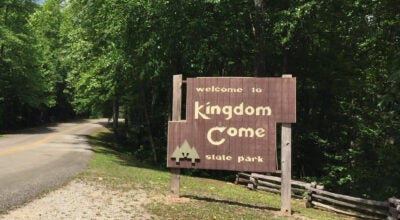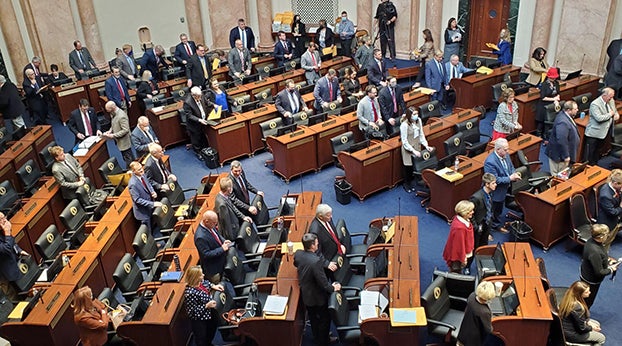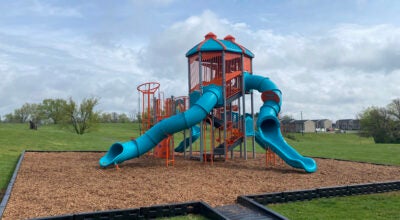Danville extends life of Parks & Rec ad hoc committee
Published 6:21 am Wednesday, June 27, 2018
Danville City Commission has voted to extend the Parks & Recreation ad hoc committee through the end of the year, but there’s still confusion surrounding exactly what the body was created to do, and exactly where Parks & Rec is heading now that its executive director will be stepping down by the end of July.
Some say the ad hoc committee was formed primarily to focus on capital improvements at Millennium Park only. Others have said since the majority of those projects have been completed, the focus should be spread to other parks in the area. Some feel the committee has served its purpose and should be dissolved.
The committee was created in March of 2016, in a joint resolution by the Danville City Commission and Boyle County Fiscal Court.
The resolution states the committee was created “in an effort to bring recommendations for improvement” pertaining to reviews of facilities and other issues relating to parks.
At Monday night’s Danville City Commission meeting, the committee was extended for six more months after a 3-1 vote was taken. After some discussion, Commissioner Kevin Caudill voted against the extension, while Mayor Mike Perros and commissioners J.H. Atkins and Rick Serres voted in favor; Commissioner Denise Terry was absent.
During Tuesday morning’s Boyle County Fiscal Court meeting, Magistrate Jack Hendricks told the court the ad hoc committee — which he sits on — had been discussing the extension, and asked if a new joint resolution was needed. Judge-Executive Harold McKinney said he thought so, but planned on having another look at it after the July 9 ad hoc meeting.
“I read the ad hoc resolution lately, and there needs to be a lot of work done to that,” Magistrate John Caywood said Tuesday. “You can’t tell who’s going to do what.”
During Monday’s regular commission meeting, City Manager Ron Scott said hopes are for the final parks master study report from Brandstetter Carroll to be returned by the end of July. Brandstetter Carroll was hired by Danville last year to complete the study, which could be made public by the Aug. 13 commission meeting.
Commissioner Atkins asked about the procedure to hire a new Parks & Rec director, since John Drake has announced his retirement, effective July 31.
“Hopefully, Parks & Rec will be receptive to a small meeting where we’ll give our ideas and proceed,” Scott said.
“… We have the task in front of us of getting a new executive director, which I’d like to know — what’s going to be the process for, how are we going to solicit and interview candidates for that,” Mayor Perros said. “Should the city and county have a role in that? … I’m not hearing any talk about a process, and as I understand it, our existing director will be out the month of July.”
“Does this need to be expanded beyond the ad hoc committee?” Atkins asked.
“Ad hoc, at its own admission, to date has only been interested in capital improvements,” Scott replied.
City Attorney Stephen Dexter said the original intention as far as the city was concerned when the ad hoc resolution was drafted was “simply for dialogue on a concrete set of issues.” He said he stands by the position that the ad hoc committee has no standing or authority “whatsoever to take any action, formal, for any body, period. No expenditure of funds, no vote on policy, but simply to make recommendations to each governing body for final decisions. I don’t think I can be clearer in that statement.”
Dexter said the continuation of the meetings needs to be very limited in scope, merely to make recommendations. He said it would be more appropriate for there to be joint meetings between both bodies “and have a very public process.”
“There are huge policy issues facing Parks & Rec … big issues that go well beyond what the committee was designed to look at years ago. It was to be a six-month endeavor to review and bring recommendations for action after six months. It’s been three years. You’re going to vote on the extension of that — my word of caution is that it’s a body to make recommendations to you and the court for final decisions. It was never intended to make decisions and act,” Dexter said.
Atkins said he has been in support of the committee being extended because “it’s so important to me to have the city and county folks talk about Parks & Rec. I was hoping for a very civil conversation, but at times it hasn’t been that.”
Atkins said he hopes when the master parks plan is released, both bodies can meet together.
Serres said it was important to him that the commission remember that the Parks & Rec board should be present for all of the upcoming conversations. “We appointed half that board and the county appointed the other half. I don’t think they should ever be excluded from any of our conversations, personally.”
“And they weren’t (excluded) from our last ones, either. They were invited to joint meetings,” Dexter said.
Dexter said while communication between the two bodies is important, it’s important for them to take a look at the original resolution. He said the committee so far, to his knowledge, has yet to bring a recommendation to the city, which is what it was charged with.
“So how long do you continue to meet under a format that has generated essentially no recommendations? You’re about to receive a master study … before you vote, you should be mindful of who views that and in what format. Is it better served in a joint meeting with both bodies? After a thorough, independent review by each? Or through the filter of the ad hoc committee? I don’t know the answer; I’m posing the question.”
Later, over the phone, Dexter explained he wasn’t slighting the ad hoc committee by cautioning the commission.
“Over time, it’s not uncommon with committees — there are so many extensions with the work. They’ve been reviewing capital expenses and talking about how the money should be spent. That wasn’t the actual intention of how it was formed in the first place, but over time as they continued to meet … It’s not uncommon for committees to end up doing more than they were initially.”
The actual decisions, Dexter said, need to be had by the governing bodies, those who are the elected people.
“We probably need to have a joint meeting between the two bodies,” he said.






